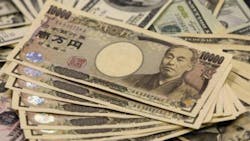Japan Inc's Foreign Forays Recall Bubble Economy
The $5 billion buyout of a British media group last week was the latest in a line of huge foreign acquisitions by Japanese firms reminiscent of their heady overseas adventures during the bubble economy.
The announcement Thursday by the country's top advertising agency Dentsu that it would pay 3.16 billion pounds for Aegis came after figures showed Japan Inc signed a record 262 overseas deals in the first six months of the year.
The buying spree, worth 3.49 trillion yen ($44 billion), topped the previous first-half record of 247 deals worth 1.16 trillion yen in 1990, in the final dizzying phase of Japan's intoxicating asset bubble, according to Tokyo-based advisory company Recof.
But, say analysts, this time it is different.
Then, Japanese manufacturers faced a stock market near all-time highs at home and were looking for something -- anything -- to put their money into, rushing headlong over a cliff when the bubble popped and the Nikkei plunged.
Now the Tokyo stock exchange is a chastened place -- the index stands at little over a fifth of its historical peak.
But firms right across a more diversified economy are selectively looking for growth in foreign markets, in a bid to escape Japan's financial doldrums where weak demand, falling prices and high labor costs are sapping profits.
They are also wallowing in cash, with the yen worth around 50% more than it was five years ago.
"For non-manufacturers, this is an excellent time to expand into foreign markets by taking advantage of a high yen," said Shinichiro Kobayashi, senior economist at Mitsubishi UFJ Research and Consulting.
"For manufacturers, it gives great opportunities to take their production bases overseas," he said. "You have to assume the yen's strength is here to stay."
The safe haven Japanese unit, now hovering around 79 to the dollar, has benefited from global economic uncertainty in the last few years, as investors have dumped the euro and the greenback.
It stood at 88 to the dollar two years ago and 122 five years back, but is now sharply higher.
Exporters, the main engine of growth for Japan, have been badly squeezed by the rocketing currency, with overseas consumers baulking at rising price tags.
But imports -- and by extension the companies that make those products -- are now cheap by Japanese standards.
Food, chemicals and services companies have marched abroad in step with automakers and machinery firms on the lookout for investments that will generate returns.
The biggest acquisition in the first half was Sumitomo Mitsui Financial Group's $7.3 billion purchase of the Royal Bank of Scotland's aircraft leasing arm.
That followed a deal unveiled by Takeda Pharmaceutical in May 2011 to buy Swiss drugmaker Nycomed for 9.6 billion euros (then $13.6 billion).
Canon (IW 1000/86) Chairman Fujio Mitarai also said in a media interview last year that the camera maker was setting aside one trillion yen for use by 2015 on mergers and acquisitions.
Japanese authorities have encouraged direct private-sector foreign investments and reiterated the mantra of "harnessing the growth of Asia and emerging markets" to boost the economy at home.
"Many years ago, it was machinery companies or automakers leading Japan's direct foreign investments," said Naonori Yamada, deputy director of international economic research for the government-backed Japan External Trade Organization.
"Now it's (consumer products or services) companies trying to firm up their access to emerging markets," as the Japanese market remains sluggish, he said.
Trading houses in the resource-poor country have also intensified their search for foreign energy and mining deals.
Earlier this year Marubeni Corp agreed to buy U.S. grain giant Gavilon LLC for about $3.6 billion, while trader Mitsubishi Corp bought a 40% stake in Encana Corp's (IW 1000/428) Canadian shale gas assets for about $2.9 billion.
"These (natural resources) deals bring together Japanese firms that have no place at home to put their money and foreign resources firms with investment needs," said Mitsubishi UFJ's Kobayashi.
Meanwhile Japanese manufacturers, such as carmakers, are rushing to boost production in Asia, Latin America and Russia to cut costs and to make products for regional customers.
"Manufacturing jobs will leave Japan, regardless of forex rates," said Kobayashi. "If you are making the same products, you are sure to lose against China and South Korea.
"It is not a case of Japanese firms abandoning Japan. They are going to places where there is demand, as they must."
Copyright 2012 Agence France-Presse
